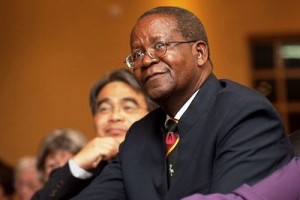In January 2015, over 300 people converged on Zaragoza, Spain to take part in the International Annual UN–Water Zaragoza Conference. The conference was used as an occasion to analyse water-related SDGs and the role of the different actors for their implementation. While addressing the participants, Leo Heller, UN Special Rapporteur for the Human Right to Water and Sanitation, called for deference and implementation of access to safe water and sanitation as a human right.
To find out what safe water and sanitation as a human right means to governments and people in developing countries, Fredrick Mugira interviewed Uganda’s minister for water and environment, Professor Ephraim Kamuntu. Prof. Kamuntu is a Ugandan economist and politician.

Mugira: Why would you consider access to safe water and sanitation a human right?
Kamuntu: Without water which is the basic necessity for your life, you can’t survive. For all your joints and bones to turn, it is because they are lubricated with water and water takes oxygen to almost every cell in your body. As a result of the centrality of water in your life, anyone who denies you access to water denies you access to life. That is why it is taken as a human right and when you are treating accessibility to water, you treat it as if indeed to deny it you have violated the very existence of the human.
Mugira: What does the human right to water and sanitation mean to people in developing countries? Will this translate into increased demand for water and subsequent water access?
Kamuntu: Yes. You know why they don’t demand for it? It is because, in their head, water comes as rain and rain comes from heaven and it is God-given. So if it is God-given, whom are you going to ask? Maybe you pray to God for rain, but the time is going to come when local people shall demand for their right to water and sanitation.
Mugira: What should governments and people in developing countries do to realise the human rights to water and sanitation?
Kamuntu: Given the centrality of water and sanitation, the first priority of government in its budget should be defence and water. Defence because without peace everything else breaks down but with peace, your next priority should be water. Because first for your own human survive, secondly because of its centrality to the rest of the economy.
Using the example of Uganda, if you harvested surface water that runs during rainy season, if you harvested rain running off the roofs of these houses plus piped water plus shallow wells plus boreholes plus gravity water, you would get 100 percent water coverage in this country, I have no doubt in my mind. But the mind-set must be addressed that this can be done both at individual level, household as well as institutional level and government. Secondly as a result of this mind-set, there is low prioritisation of water when it comes to funding within even the machinery of government. Why? Because people take water for granted. They don’t put their money. As a ministry we have been getting three percent of the total budget over the years.
Mugira: Why is access to water so important in the growth of developing countries?
Kamuntu: Water is essential for your human survival as a human being but equally important water is at the centre of every development agenda across sectors. Agriculture which is the backbone of our economy, simply the production and productivity in agriculture is dependent on availability of water. Livestock, all these animals, anything animal can only survive if it has water and when it comes to industry, agro processing, I will tell you an example: to process one litre of milk in some dairy factories in Uganda, you need 40 litres of water indicating to you that industrialisation and agro processing of these countries critically depends on availability of water. Fishing, tourism, health, mention it, all need water. Then the other pillar which is environmental, the environment which is the linkage that links with the rest is dependent on the availability of water. Wetlands, shorelines, lakes that is nothing but water.
Mugira: How is lack of water access affecting productivity of third world countries?
Kamuntu: For instance in Uganda right now, we have two types of populations affected differently. We have the urban population. In urban population most people have access to water. In fact, we put the distance of accessing water in urban areas at 0.2 kilometres. Seventy-seven percent of Uganda’s urban population has water. When you go to rural areas and the statistics we use is one kilometre distance to water source. Here, 65 percent has access to water. Thirty-five percent will have to walk more than one kilometre to get to the source of water. It is not that they don’t have water but they will have to walk more distance to get it. The implication of that, 35 percent of 35 million Ugandans is almost 12 million. Your 12 million people have to trek more than one kilometre to get to the water source every day. Now if 35 percent of your population is simply spending nearly 80 percent of their time fetching water, when will you have any time to do productive work? This is partly why Uganda remains a Third World country because a lot of it population are still having no access to water.
